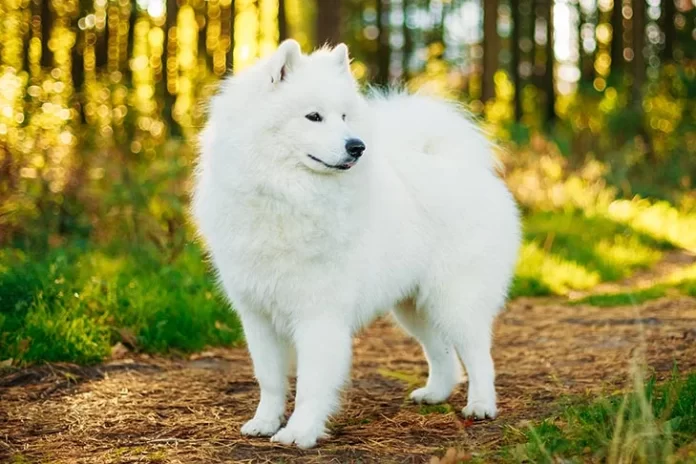Last Updated on September 24, 2023 by Fumipets
Are Samoyeds Hypoallergenic?
Samoyeds are often considered a hypoallergenic breed, but it’s important to understand what that means. While they produce fewer allergenic proteins than some other breeds, they are not entirely hypoallergenic.
Samoyeds do shed, and their dander can still trigger allergies in sensitive individuals. Regular grooming and cleaning can help reduce allergen exposure. Here are some common questions and answers about Samoyeds and hypoallergenic characteristics:
Samoyeds
The Samoyed is often known as “the smiling sled dog.” These amiable young canines are of modest size and have a herding tendency. They have a history of reproducing in some of the world’s coldest and most inhospitable places. The Samoyedic people of Siberia are where they get their name. They bred the white, fluffy canines to pull sleds and herd reindeer.
Samoyeds have long, double-layer coats covered in white, fluffy fur. They are gregarious, lively, kind, and attentive, but are Samoyeds hypoallergenic?
In this article, we address what it really means to be “hypoallergenic,” the reasons why people get dog allergies, and if Samoyed dogs are really hypoallergenic.
Definition of Hypoallergenic
Very lately has the word “hypoallergenic” been used in reference to dogs. The phrase was first used to describe the textile and cosmetic industries. They applied it to goods that were unlikely to cause an allergic response. These products often had fewer ingredients and were kinder to skin that was already sensitive.
There are several types of allergies, and virtually anything may cause an allergic reaction in a person. Some individuals with peanut allergies may only experience itching if they consume the food. Others will have anaphylactic shock and be transported to the hospital’s emergency department.
The phrase “hypoallergenic” does not imply complete safety, just that you are unlikely to have an allergic response. So, even a dog that is thought to be hypoallergenic may still cause an allergic response in someone who has a severe allergy to dogs. While it is less probable, an allergic response might still occur.
All of this is important to remember since those who have dog allergies could also be unable to possess a hypoallergenic dog. You should spend some time with them, touch them, and get close to them before you adopt them and bring them into your home. By becoming adopted and then being rehomed again, it will ultimately cause you less difficulty, allergies, and confusion in the dog.
Dog Allergy Causes
Many people think that dog hair that is shed around the house might cause allergies. While it may be connected, that is not always the case.
Actually, dander, or skin flakes, is the common allergen for dogs.
The misconception stems from the fact that dog hair often serves as a dander carrier. A dog sheds more often, which spreads more dander around the house. As the old hair falls out, the minute fragments of dead skin adhering to it float over the furniture, carpet, clothing, and corners.
It’s interesting to note that the two aren’t necessarily connected. Normally, dogs with lower shed rates are thought to be more hypoallergenic, but this is not the case with Samoyeds.
Are Samoyeds Hypoallergenic?
Nowadays, samoyeds are thought to be hypoallergenic canines. These canines, however, are less hypoallergenic than other breeds that fall under this group on a theoretical spectrum of more and less hypoallergenic.
If they spend too much time around a Samoyed puppy, most individuals who have dog allergies may still have discomfort. But, some allergy sufferers won’t feel a thing. You should spend time with dogs in general before getting a Samoyed since the likelihood of an allergic response is still quite high.
Do Samoyeds Shed a Lot?
Samoyed dogs do shed rather often. Experts vigorously discuss whether to classify them as a hypoallergenic breed in part because of this. To cause less reactions, they need more upkeep than the majority of hypoallergenic dogs.
The Samoyeds’ double coats are the other issue. They “blow” their coats twice a year, losing almost all of their underlayer at once, resulting in piles of dog hair emerging from them in big pieces. For dog owners with sensitivity, the spring and fall seasons may be particularly difficult.

Extra Precautions You Can Take
As the owner of a Samoyed puppy, there are steps you can do to reduce the allergies and reactions you could experience. One of the greatest methods to achieve this is to brush them every day. Better still, have a family member who doesn’t have allergies and give them a brush.
You should constantly groom and wash them in addition to brushing them every day. The less dust and dander your Samoyed sheds from its coat, the less probable it is to spread it around your house.
When they blow their coat twice a year, it is very important to bathe and groom them. Take them to be “blown out” at a groomer. They efficiently get rid of the bulk of their shedding undercoat during this particular grooming procedure, which reduces the quantity of hair they shed throughout the home.
In addition to keeping your Samoyed clean, make an effort to consistently keep their white fur off of your clothing and furnishings. To prevent unintentionally spreading pet dander into the air around you when you sit down, use a pet roller to remove as much of it from the sofas and chairs as you can.
Keeping them out of your bedroom, particularly away from your bed, is another smart move. Get a HEPA air filter if you discover that you still struggle to breathe at night or if you see that your eyes and nose are running more. This will help you feel better in the morning by cleaning the air you breathe all night.
Samoyeds are considered to be hypoallergenic canines even though they are often not the greatest breed for those with allergies. If having one of these happy-faced creatures has always been your ambition, get to know them well before trying ownership. Prepare to invest in a lot of effort, and maybe your Samoyed and allergies will get along just well.
Frequently Asked Questions
Are Samoyeds hypoallergenic?
Samoyeds are not entirely hypoallergenic, but they produce fewer allergenic proteins compared to some other breeds. People with allergies may still react to their dander.
Do Samoyeds shed a lot?
Yes, Samoyeds do shed, especially during seasonal changes. They “blow” their undercoat twice a year, which can result in heavy shedding.
Can people with allergies own Samoyeds?
People with mild allergies may be able to own Samoyeds with proper grooming and cleaning practices. However, those with severe allergies should be cautious.
How can I reduce allergens from Samoyeds?
Regular grooming, including brushing and bathing, can help reduce loose fur and dander. Cleaning the living environment and using air purifiers can also be beneficial.
What makes Samoyeds a popular choice for allergy sufferers?
Samoyeds have a minimal dander and produce fewer allergenic proteins, making them a more suitable choice for some people with allergies compared to other dog breeds.


















